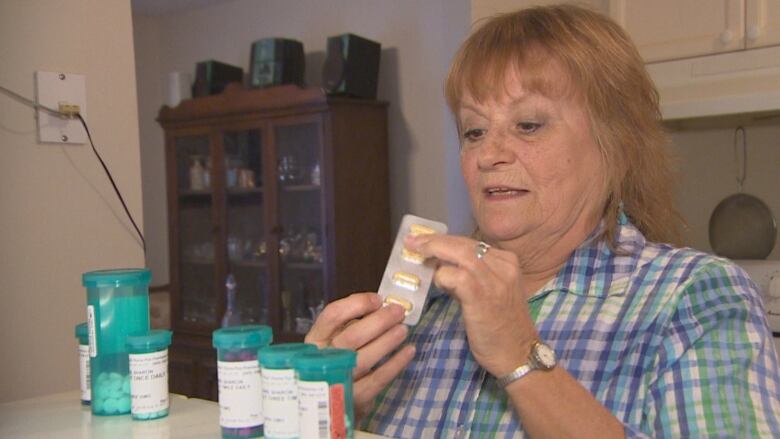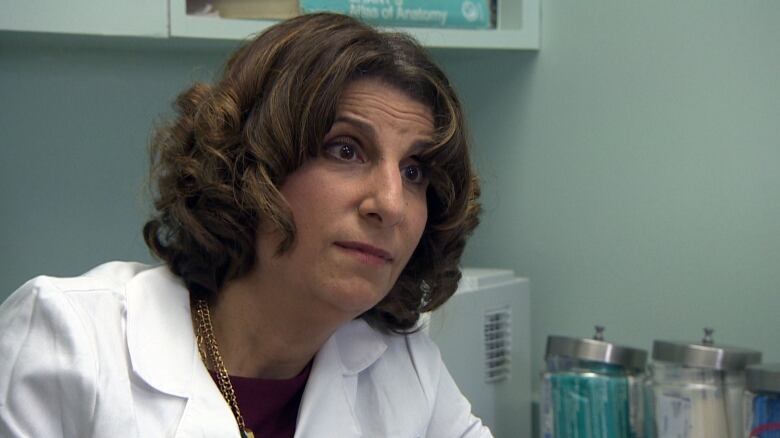Doctor wants to stop 'sticker shock' for patients picking up prescriptions
Patients often don't know how much their drugs will cost, nor do the doctors prescribing them

A Toronto family doctor thinks she has a prescription for the nasty surprise many patients experience when they go to the pharmacy and learn just how much their medications will cost.
Dr. IrisGorfinkelsaysdrug prices should beeasily searchablein existing electronic records systems so doctors most of whom don't know the pricesoff the top of their head can discuss cost with patientsand check if there are cheaper alternatives.
"Providing cost-effective care is simply not possible in the absence of accurate knowledge of drug costs,"Gorfinkel says in a commentary published Monday in the CanadianMedical Association Journal (CMAJ).

It's a problem Sharon Dennis knows all too well.
Dennis, now 62, spent more thana decade receiving treatment for leukemia at the Juravinski Cancer Centre in Hamilton, Ont. But in 2015, when her doctor prescribed a better medication she couldtake at home, he didn't tell her the price or if it was covered under her plan.
So when Dennis spoke to the pharmacist, she was in for a surprise.
"They came over and said it was $5,100 for one month's supply. And I was like, 'Wow. Don't bother filling it because I can't afford it.'"
Dennis went almost four months without taking the medication, Bosulif. Her insurance company originally agreed to pay but only if she shelled out the money first and submitted a claim afterward. Dennis was terrified the lag in waiting for the reimbursement would ruin her financially. After months of arguing and pleading, she finally convinced her insurer to pay the cost of the medication directly to the pharmacist.
While Dennis doesn't fault her doctor for prescribing the medication, she wishes he had been able to tell her the price upfront.
"I would have liked to have known all of the options ahead of time, before I got this sticker shock at the drugstore."
According to the most recent national survey conducted by the Angus Reid Institute in July 2015, more than one in five Canadians said they or someone in their household didn't take their meds as prescribed, if at all, because of the cost.
Canada has among the highest prescription drug prices in the world. On a per capita basis, only patients in the U.S. and Switzerland spendmore thanCanadianson pharmaceuticals, according to the Organization for Economic Co-operation and Development (OECD).

Gorfinkel says most doctors aretoo busy to research how much every drug costs. So she'spushing for an electronic fix thatwould allow doctors to see the price of medications on their computer screens as they discuss treatment options with their patients.
"So the idea is the cost comes up inreal time when the prescription is being provided. And that opens the dialogue."
Gorfinkel believes that dialogue could also help reduce overallspending on medicationsbecause doctors and patients would be able tosee whether cheaper options are available.
'Swallowed my pride'
Heidi Bauer would have liked to have had that type of conversation when she was diagnosed with breast cancer five years ago. The 43-year-old registered massage therapist in Ottawawas the breadwinner while her husband stayed at home to care for their 18-month-old son.
"I swallowed my pride and asked family and friends for money and donations. Those are things that I never expected to have to do, or that I would be comfortable doing," Bauer said. "But definitely that's what I had to do in order to keep going forward with the treatment plan that was given to me."
Patients suffer when cost isn't factored into the discussion with their doctor, said Toronto pharmacist Mina Tadrous, who often hasto break the news.
"It often goes a little bit like, 'Oh, that's how much it's going to cost? OK, well, let me think about it.' And the moment they walk out that door, I know I'm probably not going to see them again for that specific prescription."
He fears the situation is likely going to get worse as drug prices continue to rise.
He says Gorfinkel's idea of having prescription prices readily available electronically could bring clarity to the conversation.
"I think there's a huge gap here and an opportunity to develop tools and look at ways to make it easier to fit [price-checking] into the doctor's schedule," Tadrous said. "At the same time, it will help patients walk out with the right prescription."
Gorfinkel started a petition urging the Ontario government to add drug price information to existing electronic records systems. The Ontario Medical Association officially endorsed her proposal back in November.
"I finally realized nobody's doing it unless I try to make it happen," Gorfinkel said. "I'm hoping there will be enough interest around this to make change in a real intransigent system."
With files from Christine Birak













_(720p).jpg)


 OFFICIAL HD MUSIC VIDEO.jpg)
.jpg)



























































































